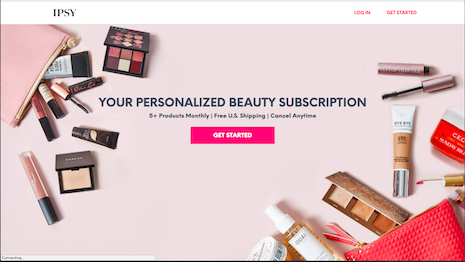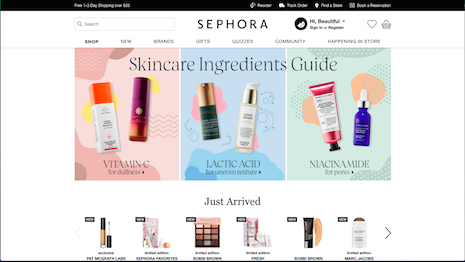- About
- Subscribe Now
- New York,
February 25, 2020

 Subscription services have disrupted the beauty business, but there are questions about the disruptors' staying power. Image credit: Ipsy
Subscription services have disrupted the beauty business, but there are questions about the disruptors' staying power. Image credit: Ipsy
Beauty is having a moment of disruptive growth.
Direct-to-consumer sales channels, sustainable and organic products, shoppable social platforms and the meteoric rise of beauty bloggers and vloggers have helped power the emergence of new independent brands and sustained growth in the now $532 billion global beauty industry.
Allied Market Research has estimated the luxury beauty industry alone to be $55.6 billion in 2019, reaching $81.2 billion in 2024.
Stand out from pack
The continued growth in the luxury segment means more brands and product lines from which customers can choose. It also represents an opportunity for luxury beauty to continue disrupting the market in a significant way. How? By prioritizing customer service as a way to differentiate from the ever-growing pack of brands.
Providing stellar customer service may not seem like the most obvious strategy for creating exclusivity.
However, with so many brands chasing the latest fad and product innovations being easily copied, service stands out as a key to sustainable differentiation, word-of-mouth and continued loyalty.
As the beauty industry becomes more inclusive and expansive, upscale beauty brands such as BoxyCharm, Glossier, Ipsy, MAC, Sephora and Tarte are using the way they handle customer relationships and interactions as a top differentiator.
The new crop of modern beauty brands understand that, to create exclusivity, they must provide high-touch, concierge-level service that will, in turn, help recreate the in-store shopping experience online.
These brands see service as a chance to cement relationships and strengthen ties with their customers, while creating that intangible aura of luxury today’s top brands possess.
Here is how a simple, but powerful shift to customer service can help beauty brands provide service that is as luxurious as their product offerings.
Create exclusivity via personalization
With so many beauty brands to choose from, consumers are in control and can be picky when making shopping decisions.
At the same time, beauty brands, more so than in many other industries, have the opportunity to create loyal, lifetime customers who are dedicated to a specific skincare product or lipstick shade.
But, with product differentiation harder to maintain, brands cannot bank on unique features or ingredients to sustain loyalty.
Nowadays, customers have come to expect the brands they favor to personalize their interactions, and understand and anticipate their needs. This means brands must be equipped to communicate with them in the way the customer chooses, whether via phone, email, text or chat.
In addition, brands can put themselves and their agents in a better position by using historical data about past purchases and preferences to have informed and effective conversations.
Some brands have been able to leverage support from their customers to grow and engage their customer communities. Glossier puts this in action every day.
The gTeam – Glossier’s customer experience team – works to deliver personal, one-to-one service to its fanbase and, as a result, incorporates community feedback into product design and development of hit products, such as Milky Jelly Cleanser.
Glossier has also used the relationships it has built with customers to not only build brand loyalty, but also better anticipate questions or concerns customers may have about its products and provide the gTeam with responses that they can customize to the shopper.
Other examples of personalization in the industry include beauty subscription brand BoxyCharm, which is pushing personalization through concealer and foundation samples and encouraging subscribers to take an online questionnaire to find their right match for future products.
Cosmetics brand Tarte is using personalization to pleasantly surprise consumers by sending handwritten postcards to thank customers for their business or respond to a specific query.
 LVMH-owned retailer and cosmetics brand Sephora has created a loyalty program that has won plaudits for its effectiveness. Image credit: Sephora
LVMH-owned retailer and cosmetics brand Sephora has created a loyalty program that has won plaudits for its effectiveness. Image credit: Sephora
Get emotional
With more purchases happening online without human interaction, customer service agents may be the only touch point a customer has with the brand.
This means that every interaction needs to be treated as an important conversation, and not as a ticket that is meant to be resolved as quickly as possible.
Beauty brands can help their agents deliver authentic conversations with their customers by employing real-time sentiment analysis before a conversation even begins.
This means that agents can gauge the emotional state of a customer before starting a conversation so that they can mirror voice tone and word choice.
Sentiment analysis can also be used to segment and message customers so that special services or offers can be sent to help improve sentiment.
By helping to manage the emotions of customers, brands can better respond and improve sentiment, building loyalty and lasting good will.
Treat each customer like a VIP
Customers buying luxury beauty items have expectations not only in regards to the products they have bought, but also how they will be treated by the brand. They expect service issues to be handled quickly and correctly the first time. This includes ensuring they do not have to repeat themselves to different agents and be passed around for a solution.
Omnichannel customer service helps brand deliver VIP service so that no matter via what channel customers contact a brand, or if they speak with different agents, they should receive a consistent solution that is handled quickly, efficiently and effectively.
Another way to treat customers like VIPs is to reward customer love and loyalty.
Sephora’s Beauty Rewards program recently increased its rewards offerings and added new tiers.
Loyalty programs have proven a powerful way to engage customers and thank them for their purchases.
Similarly, MAC’s loyalty program, MAC Lover, offers Lover-only products, free makeup lessons and exclusives invites, reinforcing the VIP feeling.
Subscription service Ipsy takes loyalty a step further: not only do you get points for shopping and sharing reviews, but also for referring friends to the service.
LUXURY BEAUTY BRANDS need to focus as much on how they serve customers post-sale as they do during the shopping experience.
Proactive customer engagement is often the last thing customers expect and that is exactly what can separate the great experiences from the good, or just fine.
By surprising customers with exceptional service, brands can build lasting customer relationships and authentic brand ambassadors.
 Brad Birnbaum is cofounder/CEO of Kustomer
Brad Birnbaum is cofounder/CEO of Kustomer
Brad Birnbaum is cofounder/CEO of Kustomer, New York. Reach him at brad@kustomer.com.
Share your thoughts. Click here